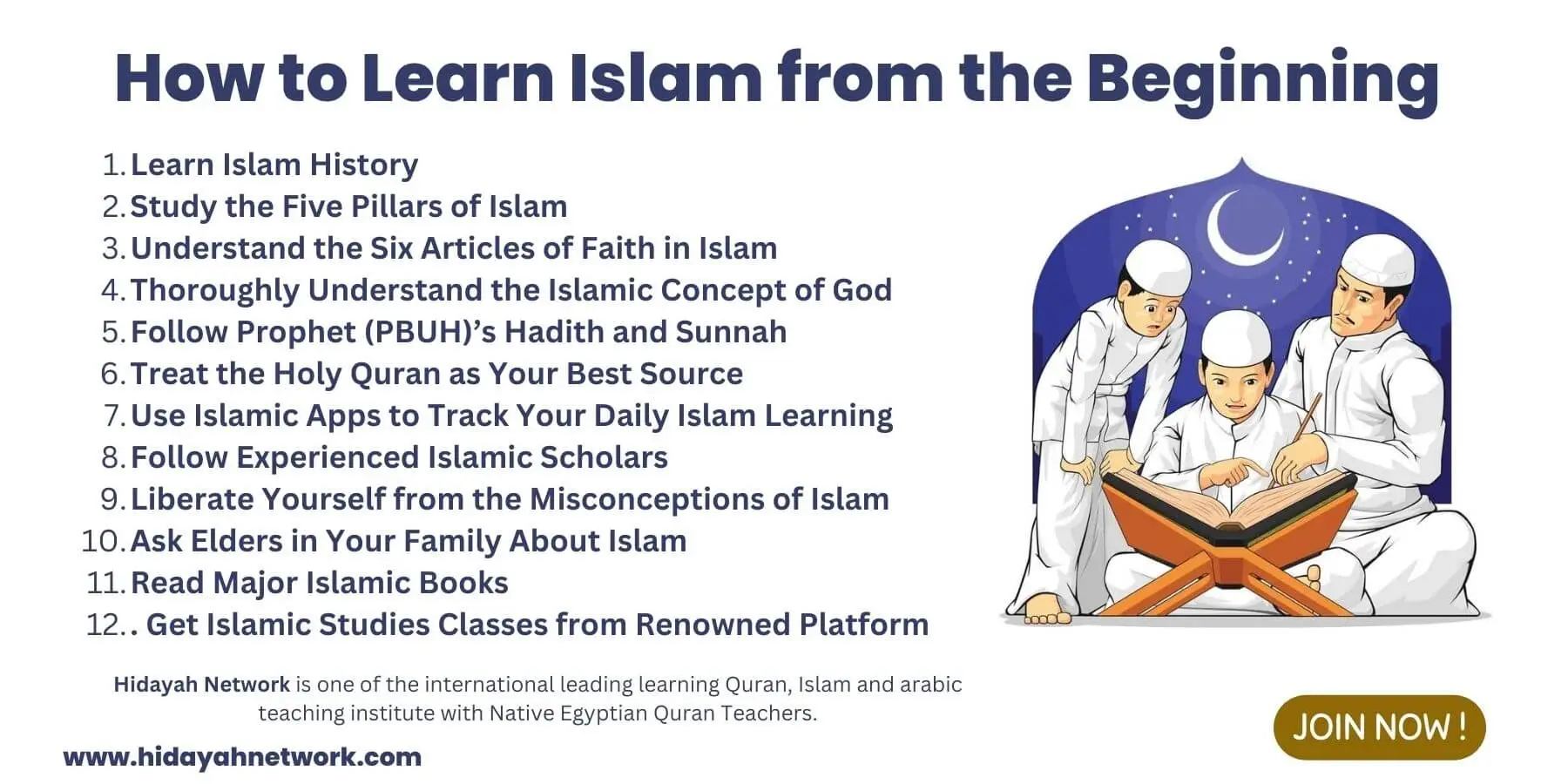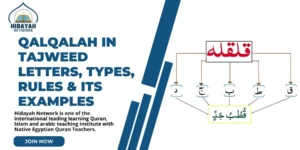Learning Islam from the beginning requires a strategic approach. It’s a step-by-step process in which you need to start by learning Islamic history, studying the pillars of Islam, and the articles of faith, understanding the concept of God in Islam, following the hadith and sunnah, following experienced Islamic scholars, asking elders in your family about Islam, and so on.
To achieve all that as a beginner, you need expert guidance. Today, Hidayah Network will provide you with in-depth guidance on how to truly learn Islam when you’re starting early. Let’s go through each step in detail below to help enhance your knowledge about Islam.
Table of Contents
Toggle12 Steps to Learn Islam from the Beginning
Here’s a structured and step-by-step approach to learning and understanding Islam from the beginning:
Step 1. Learn Islam History
First, you must know about the history of Islam. The Quran was revealed over 23 years ago to Prophet Muhammad in Mecca and Medina. The first revelation was in Cave Hira in Mecca. Muhammad’s migration from Mecca to Medina, known as the Hijra, marks the beginning of the Islamic calendar. Battles like Badr, Uhud, and the Treaty of Hudaybiyyah were pivotal.
The conquest of Mecca and the Farewell Pilgrimage are significant events. The spread of Islam beyond Arabia after Muhammad’s death shaped world history. Understanding these milestones provides context to Islamic teachings and practices.
Step 2. Study the Five Pillars of Islam
The Five Pillars of Islam are the foundation of a Muslim’s faith and practice. They outline the fundamental acts of worship and obedience to Allah.
Learning these pillars is crucial for beginners to grasp the core beliefs and rituals of Islam. They provide a framework for living a righteous and fulfilling life according to Islamic teachings.
| Pillar | Description |
| Shahada | Declaration of faith in the oneness of Allah and Muhammad as his messenger. |
| Salah | Performing five daily prayers facing the Kaaba in Mecca. |
| Zakat | Giving alms or charity to those in need, typically 2.5% of one’s wealth annually. |
| Fasting | Fasting during the month of Ramadan from dawn to sunset. |
| Hajj | Making the pilgrimage to Mecca at least once in a lifetime, if physically and financially able. |
Step 3. Understand the Six Articles of Faith in Islam
The Six Articles of Faith are the core beliefs that every Muslim must uphold. They provide a framework for understanding the unseen aspects of Islam.
Learning these beliefs is essential for beginners to grasp the foundational principles of faith. They guide Muslims in their relationship with Allah and their understanding of the universe.
| Article | Description |
| Belief in Allah | Acknowledging the oneness and sovereignty of Allah as the one true God. |
| Belief in Angels | Accepting the existence of angels as spiritual beings created by Allah to carry out His commands. |
| Belief in Prophets | Believing in the prophets and messengers sent by Allah to guide humanity, including Muhammad. |
| Belief in the Day of Resurrection | Affirming the divine scriptures revealed by Allah, including the Quran, Torah, and Gospel. |
| Belief in the Day of Resurrection | Believing in the Day of Judgment when all beings will be resurrected and held accountable. |
| Belief in Fate (Qadr) | Trusting in Allah’s predestination and decree, understanding that everything happens by His will. |
Step 4. Thoroughly Understand the Islamic Concept of God
In Islam, the concept of God, known as Tawheed, asserts the oneness of Allah, the sole creator of the universe. Allah is beyond human understanding yet present in every aspect of existence. This duality, known as transcendence and immanence, highlights Allah’s boundless nature and His intimate connection with His creation.
The Quran emphasizes this in Surah Al-Baqarah (2:255), stating, “Allah – there is no deity except Him, the Ever-Living, the Sustainer of [all] existence. Neither drowsiness overtakes Him nor sleep.” This verse underscores Allah’s uniqueness and eternal presence.
Step 5. Follow Prophet (PBUH)’s Hadith and Sunnah
Following the Hadith and Sunnah means adhering to the teachings, actions, and sayings of Prophet Muhammad (PBUH). Beginners need to learn because it provides practical guidance on how to live Islamically.
Hadiths offer insights into various aspects of life, from worship to daily conduct, helping Muslims emulate the Prophet’s exemplary behavior. Sahih Bukhari, a collection of authentic Hadiths, includes:
- “Actions are judged by intentions.” (Sahih Bukhari, Book 1, Hadith 1)
- “The strong believer is better and more beloved to Allah than the weak believer.” (Sahih Bukhari, Book 76, Hadith 509)
- “The Prophet said, ‘The religion is naseeha (sincerity and sincere advice).'” (Sahih Bukhari, Book 2, Hadith 13)
Step 6. Treat the Holy Quran as Your Best Source
Treating the Quran as your best source means considering it the ultimate guide for life. It’s crucial for beginners because it contains Allah’s direct words revealed to Prophet Muhammad (PBUH).
The Quran provides guidance on all aspects of life, including worship, morals, and societal matters. It’s the primary source of Islamic law and ethics. The Quran is unmatched in its clarity, wisdom, and universal relevance.
It offers solutions to contemporary challenges while also addressing timeless truths. Muslims believe it’s the eternal word of Allah, unaltered since its revelation over 1,400 years ago.
Step 7. Use Islamic Apps to Track Your Daily Islam Learning
Using Islamic apps means utilizing digital tools to enhance your understanding and practice of Islam. It’s vital for beginners as these apps offer accessible resources like Quranic verses, Hadith collections, prayer times, and educational materials. They provide structured learning, reminders for daily practices, and access to knowledgeable scholars.
Islamic apps help beginners stay consistent in their learning and deepen their understanding of Islam at their own pace. They offer a sense of community by connecting users with like-minded individuals worldwide.
Here are 5 Islam apps for reference:
- Muslim Pro
- Quran Companion
- Hadith Collection & Sahih Bukhari
- Muslim Central: Quran & Audio
- iPray: Prayer Times & Qibla
Step 8. Follow Experienced Islamic Scholars
Following experienced Islamic scholars means seeking guidance and knowledge from those who have extensive understanding and expertise in Islam. It’s crucial for beginners as scholars offer interpretations, explanations, and practical advice on religious matters.
Scholars provide mentorship, answer questions, and provide direction in navigating religious practices and ethical dilemmas. By following them anyone can start its journey to become an Islamic scholar. Here are two renowned Islamic scholars:
- Mufti Menk: A Zimbabwean Islamic scholar is known for his lectures and guidance on various aspects of Islam.
- Nouman Ali Khan: A Pakistani-American Muslim speaker and founder of Bayyinah Institute, renowned for his Quranic exegesis and linguistic insights.
Step 9. Liberate Yourself from the Misconceptions of Islam
Let’s address some misconceptions about Islam:
Misconception 1: Islam oppresses women.
Clarification: Islam emphasizes the rights and dignity of women. The Quran states in Surah An-Nisa (4:32), “And do not wish for that by which Allah has made some of you exceed others. For men is a share of what they have earned, and for women is a share of what they have earned.” This verse highlights equity in earning and ownership.
Misconception 2: Islam promotes violence.
Clarification: Islam condemns aggression and promotes peace. The Quran states in Surah Al-Ma’idah (5:32), “Whoever kills a soul unless for a soul or for corruption [done] in the land – it is as if he had slain mankind entirely.” This verse underscores the sanctity of life and prohibits unjust killing.
Misconception 3: Islam is incompatible with modernity.
Clarification: Islam encourages adaptation while preserving core values. The Quran states in Surah Al-Hajj (22:77), “O you who have believed, bow and prostrate and worship your Lord and do good – that you may succeed.” This verse emphasizes the importance of worship alongside worldly endeavors.
Step 10. Ask Elders in Your Family About Islam
Asking elders in your family about Islam means seeking knowledge and guidance from those who have lived and practiced the faith for many years.
It’s crucial for beginners because elders possess wisdom, experience, and firsthand knowledge of Islamic teachings. They can provide valuable insights, personal anecdotes, and practical advice on how to navigate religious practices and challenges.
Elders often embody the values and traditions of Islam, offering a tangible connection to the faith’s heritage and legacy. Their guidance fosters a sense of belonging and continuity within the family, nurturing a deeper understanding and appreciation of Islam for beginners.
Step 11. Read Major Islamic Books
Reading major Islamic books means delving into foundational texts that explore various aspects of Islam, including its history, theology, jurisprudence, and spirituality. It’s crucial for beginners because these books offer comprehensive insights into the principles, practices, and beliefs of Islam.
The books provide a deeper understanding of the faith’s rich heritage and diverse traditions, guiding beginners on their journey towards spiritual growth and knowledge. Here are two excellent Islamic books for reference:
- “The Sealed Nectar” (Ar-Raheeq Al-Makhtum) by Safiur Rahman Mubarakpuri: A comprehensive biography of Prophet Muhammad, providing insights into his life, character, and mission.
- “The Forty Hadith of Imam Nawawi“: A collection of forty sayings of Prophet Muhammad compiled by Imam Nawawi, covering various aspects of faith, ethics, and spirituality
Step 12. Get Islamic Studies Classes from Renowned Platform
Hidayah Network offers comprehensive Islamic studies for kids and beginners classes, providing structured and accessible learning opportunities for all levels of learners. Key aspects of this platform include:
- Classes led by renowned scholars with expertise in various fields of Islamic knowledge.
- Courses covering Quranic studies, Hadith, Fiqh (jurisprudence), Tafsir (exegesis), and more.
- Engaging lectures, discussions, and Q&A sessions to facilitate understanding and engagement.
- Convenient online online classes accessible from anywhere at any time.
- Access to a supportive learning community for guidance and encouragement.
Conclusion
Following the steps outlined in this article, beginners can gain a solid foundation in Islamic knowledge and practice. From studying the Quran and Hadith to seeking guidance from scholars and elders, each step plays a crucial role in deepening understanding and connection to the faith.







